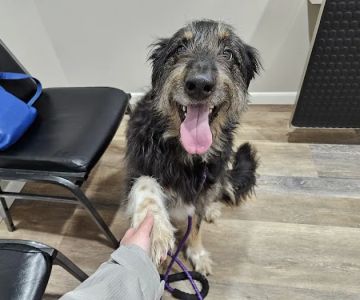What to Do After Earning Your Veterinary Degree: Exploring Career Paths and Opportunities
- Post-Degree Career Options for Veterinarians
- Starting Your Own Veterinary Practice
- Further Education and Specialization
- Working Abroad with a Veterinary Degree
- Alternative Careers for Veterinarians
1. Post-Degree Career Options for Veterinarians
After years of rigorous study and hard work, earning your veterinary degree is a major accomplishment. But what comes next? The journey doesn’t end with graduation—there are countless opportunities available for veterinarians to pursue, whether in traditional clinical practice or in other exciting fields. As someone who has navigated the early years of my career, I can confidently say that the options are vast, and choosing the right path can be both exciting and overwhelming. Here's what I learned about the options available after earning your veterinary degree.
For many, the first choice is to work as a general practitioner, treating a wide range of animals. This role allows you to gain hands-on experience and establish relationships with clients. During my early years in practice, I enjoyed the diversity of cases, from routine check-ups to more complex surgeries. Working as a general practitioner helped me build the foundation of my veterinary career, but there are other equally fulfilling paths to explore as well.
2. Starting Your Own Veterinary Practice
If you’ve ever thought about running your own business, starting your own veterinary practice could be an exciting venture. Owning a practice allows you to shape the direction of your career, set your own hours, and provide a unique experience for your clients. When I considered opening my own clinic, I realized it would take more than just medical expertise. Business acumen, management skills, and a solid understanding of finances are essential for success in this field.
Starting a practice involves many steps, from securing financing and finding the right location to hiring a team and navigating legal requirements. It can be daunting, but with the right planning and dedication, it can also be incredibly rewarding. I found that surrounding myself with a strong team, including administrative and financial professionals, helped my clinic thrive. If you’re entrepreneurial and ready to take on a leadership role, starting your own practice could be the next step after obtaining your veterinary degree.
3. Further Education and Specialization
After earning your veterinary degree, further education and specialization are always options for those looking to deepen their expertise in a specific area. Specializing in fields such as surgery, cardiology, dermatology, or even exotic animal care can lead to more focused and often higher-paying roles. I personally chose to pursue additional training in surgery, and it made a tremendous difference in my career satisfaction and opportunities. Specialization allows you to become an expert in a field that you’re passionate about, and it can open doors to teaching, research, or consulting roles.
Residency programs and board certification are common paths for veterinarians wanting to specialize. While these programs require years of additional study and clinical work, they often lead to highly rewarding careers. If you’re unsure about specializing right after graduation, consider working in a general practice for a few years to gain experience and discover where your interests lie. Continuing education is also key—many veterinarians take advantage of online courses, workshops, and conferences to stay current in their field.
4. Working Abroad with a Veterinary Degree
As I ventured further into my veterinary career, I became increasingly interested in working abroad. Many veterinarians choose to work internationally to experience different cultures and treat animals in diverse settings. Working abroad can be an enriching experience that broadens your clinical skills and provides new challenges. Some regions may have different veterinary needs, whether due to local animal populations or unique healthcare challenges.
For example, working in animal conservation in Africa or Asia allows veterinarians to assist in protecting endangered species or providing care in underserved areas. Some veterinarians even pursue opportunities in disaster relief or volunteer organizations. If you have an interest in global health or wildlife conservation, working abroad can offer a unique and fulfilling way to use your veterinary degree. However, it’s important to research the qualifications needed in different countries and consider language barriers, culture, and work conditions before making a decision.
5. Alternative Careers for Veterinarians
While clinical practice is the most common route for veterinarians, there are many alternative career paths that make use of veterinary skills and knowledge. Veterinary professionals can explore opportunities in industries such as pharmaceuticals, animal welfare organizations, pet nutrition, and animal behavior. I’ve known several colleagues who transitioned from practice to roles in veterinary research or regulatory agencies, where they contribute to the advancement of animal health policies and research.
Veterinary public health is another exciting alternative, where professionals work with government agencies to address zoonotic diseases, food safety, and animal welfare. If you're interested in making an impact on a larger scale, these roles can be incredibly rewarding. Veterinary consultants, educators, and even writers specializing in animal health are also in high demand. For me, exploring different avenues within the veterinary field has provided a fulfilling and dynamic career. If you're interested in branching out, I highly recommend exploring industries where your veterinary skills can make a difference in non-clinical settings.
6. Finding Your Path After Veterinary School
The journey after completing your veterinary degree can seem like a vast and open field of possibilities. Deciding where to take your career next requires careful thought, but it’s also an exciting opportunity to shape your future. Whether you choose to enter clinical practice, specialize in a specific field, start your own practice, or explore alternative careers, there’s a world of opportunity ahead. The key is to stay open to learning, remain adaptable, and embrace the path that excites you most.
One of the most rewarding things I’ve learned over the years is that the veterinary profession is incredibly versatile. Whether you’re helping pets live their healthiest lives or working on wildlife conservation, there is always a way to make a difference in the lives of animals and the people who love them. As you take the next steps after obtaining your veterinary degree, trust that the skills you’ve acquired and the passion you have for animals will guide you toward a successful and fulfilling career.
If you’re looking for more resources on career opportunities after veterinary school, I highly recommend visiting websites and networks tailored to the veterinary profession. You’ll find helpful advice, mentorship opportunities, and job listings that can help you make the most of your veterinary degree.











